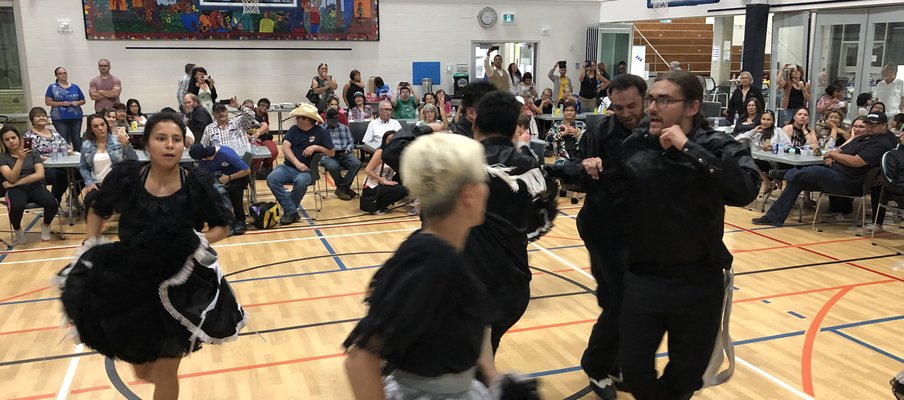
Gathering Focuses on Reconciliation and Relationship-Building
In this issue
 Engage - Volume 10, Issue 2, Spring 2020
Engage - Volume 10, Issue 2, Spring 2020
Related Programs
For its 50th anniversary, the Métis Addiction Council of Saskatchewan Inc. (MACSI) threw a party – a Métis Kitchen Party and community gathering aimed at bringing the community – both Indigenous and non-Indigenous together in a free, accessible, alcohol free celebration that emphasized Métis culture, and reconciliation.
The Regina event took place at the mâmawêyatitân centre on July 27, 2019 and between 200 and 300 people attended the dry dance and community gathering focusing on Indigenous culture and entertainment in a healthy substance-free environment.
“In Métis culture, people have had kitchen parties around fiddling and jigging and food for many years,” says MACSI spokesperson Shayne Lazarowich, adding that it fits well with the Calls to Action focussed on education. “All elements of society need to take part in events like this. Traditional Métis culture focused on jigging and jigging lessons, the music, and traditional foods.”
The event took place in the North Central neighbourhood where people from more modest economic households might not have access to this kind of free entertainment and social gathering on a regular basis, he added. “It was accessible to those in the core neighbourhood. Some of our advertising reached a wider demographic but a lot of people came from word of mouth in that area, and mâmawêyatitân let clients and people in the community know, as did our partners in the area, such as All Nations Hope Network.”
Partnership was key, not only with SaskCulture, mâmawêyatitân centre and All Nations Hope Network, but many other organizations. “Those kind of partnerships were what we wanted to do with all our activities throughout the province, reaching both Indigenous and non-Indigenous peoples.”
They plan to continue with these Métis kitchen parties, community gatherings, and larger Métis cultural festivals going forward, as well as celebrations on June 30th, National Indigenous Peoples’ Day, and November 16th, commemorating Louis Riel. The next dance is already being planned in Regina for July 2020, alongside successful events in Prince Albert and Saskatoon.
“Regina had a lot more little kids and families than Prince Albert for example, and the families were happy with watching the professionals, like the Qu’Appelle Valley Squaredancers led by Courtney Anaquod, and Terri-Anne Strongarm performing with Highway Express.”
Lazarowich notes that not only did it provide reconciliation in action, but promoted a positive message, with lots of compliments from those in attendance. “So many people said it’s so nice to have events like this, entrance by donation, where there’s no alcohol involved,” he said. “You can come and have fun in a safe environment with no booze. We need more events like that, that people can feel comfortable at, and there’s no stigma attached. We do that because we’re a treatment centre and don’t have alcohol at any event: but it does lend itself to a nice environment.”
They also reached out to newcomers to Canada.
“The new immigrants really enjoyed it. It was an opportunity for them to learn directly, not second-hand or through a textbook, about Indigenous culture,” Lazarowich says. “All events were successful to the point that we’re doing them again. We’ve built partnerships and infrastructure. It was a huge success and it means you can build on what you’ve already done moving forward. We’ve strengthened our capacity as an Indigenous organization.”
Often people hear about MACSI under less celebratory circumstances, he noted, such as someone needing access to addictions and treatment counselling, which is “the bulk of our work and very important, but it’s nice to have other exposure too.” This is a chance for the organization to instead celebrate the resilience and joy of the Métis culture. “Clients came to the events and it’s an opportunity for those doing serious work in healing and rehabilitation to enjoy positive cultural events too.”
Most of all, “everyone needs culture and healing, whether or not they’re afflicted by drugs and alcohol. We succeeded in making Indigenous entertainment the focus. In mainstream events you don’t see that,” says Lazarowich.
He goes on to appreciate organizations that supported the event such as SaskCulture. “Without this kind of support, it is not possible to offer high quality entertainment to the general public for free. Some people just don’t have that $50 to attend a live music event, or if they do they need to prioritize it for groceries or rent. That’s reconciliation in action.”
This project was supported through SaskCulture's Métis Cultural Development Fund.

